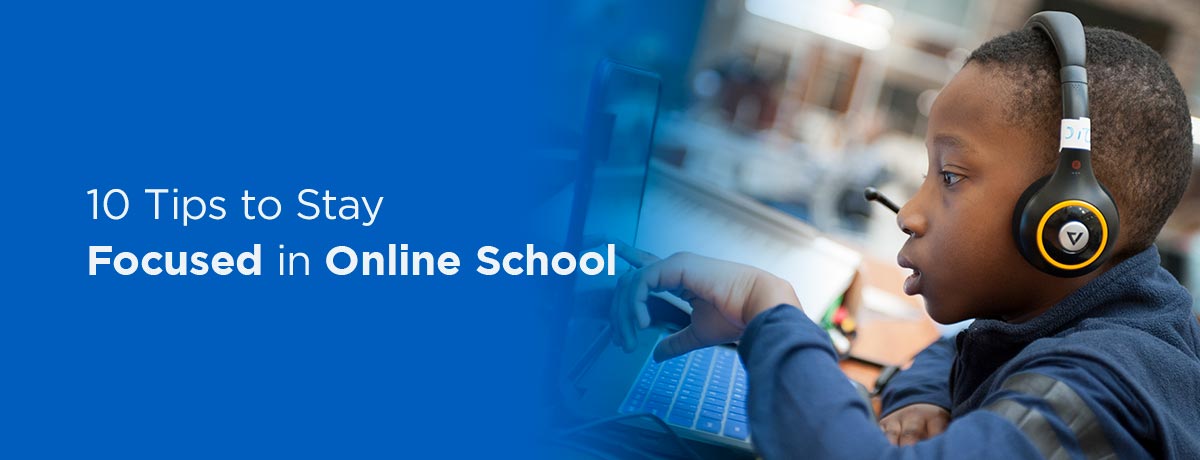2025-2026 School Year Enrollment Now Open. Click Here
2025-2026 School Year Enrollment Now Open. Click Here

Online schooling provides many opportunities for flexible scheduling and customized learning. However, kids can be easily distracted in any learning environment. Helping them maintain focus is essential to their daily work routine. Luckily, there are many ways to reduce distractions and stimulate learning for your child.
As a parent, you can do many things to help your child work, learn, and study effectively. Efforts such as eliminating distractions from their workspace and encouraging them to set positive goals can make a considerable difference in their academic performance. Learn how to stay focused doing online school with these 10 tips.
Eating a healthy diet can improve academic performance, so encourage your student to eat a nutritious breakfast before starting classes in the morning. Rather than fueling the body with sugary cereals and pastries, here are some healthier breakfast foods to feed your child:
Multiple distractions can hinder your child’s ability to learn and pay attention. Distractions can include a messy study space, noises, other people, and technology like phones, social media, and non-school-related websites. Eliminate distractions as much as possible so your child can focus and learn effectively.
Ensure they have a quiet, organized workspace away from high-traffic areas in your home. If your child is easily distracted by technology, you might consider blocking social media and other websites during classes or studying sessions.
Class discussions allow students to learn from one another and contribute meaningful insight to course content. They motivate students to prepare for class and think creatively. Encourage your child to participate in class discussions. If they’re shy or hesitant about this, here are some ways you can help them:
Good notetaking is essential for understanding the material and studying effectively for tests. Ensure your student has a quality notebook and writing utensils to jot down important information. Colorful highlighters and pens make it easier to emphasize key points, and they can make notetaking more fun for your student.
Your student’s workspace should be separate from areas where they relax, sleep, and eat. A separate study space ensures that their mental associations with work time and free time are distinct and disconnected.
To separate your child’s personal life from school, dedicate a specific area in your home to their schooling. If you can, a spare room or office is ideal. However, a desk they use only for studying can work in any room. Their study space should be clean, organized, and ergonomically friendly, with a comfortable chair and desk.
Students with an optimistic mindset toward school often perform better academically, as it can boost their motivation and ability to learn. For this reason, you should promote positive thinking and goal-setting for your student.
Encourage your child to write down specific goals they’d like to accomplish for the school year, like improving their math grade or getting more involved in class discussions. Help them track their progress toward these goals, offering them words of encouragement along the way.
Have your child consistently write down important dates and assignments in a planner. A personal planner can help them stay organized, prioritize their tasks, and improve time management skills. Help your child find a quality planner to map out a clear to-do list each day.
Establishing a consistent schedule and study routine will help your child succeed in school. Help them create a balanced schedule for taking classes, studying, doing schoolwork, and enjoying downtime.
Many online schools have a personalized management system where students can access course content, track attendance, and schedule a flexible school day. This can also help your student organize and maintain their schedule.
While making time for school is critical, your child should also take breaks so they aren’t overwhelmed. Regular breaks are essential for developing social skills, getting physical exercise, reducing stress, and increasing productivity and attentiveness.
When deciding how to build breaks into your child’s schedule, consider the Pomodoro Technique as a guide. This method breaks the workday into 25-minute blocks, each followed by a five-minute break. These intervals are known as “pomodoros.” This time management technique emphasizes working with the time you have rather than against it.
Earlier, we mentioned that eating a nutritious meal before class is important for your child’s academic performance. In addition to healthy eating habits, ensure your child gets a good night’s sleep before each school day as well.
Sufficient sleep can boost memory and cognition, recharge our physical and mental batteries, and facilitate learning. It can also reduce stress and help maintain a healthy daily routine. Help your child get plentiful sleep every night before school — they should have a dark bedroom, comfortable pillows and blankets, and zero distractions from electronics or noise.
Knowing how to focus better in online school is pivotal to your child’s academic success. At Commonwealth Charter Academy (CCA) in Pennsylvania, we optimize technology to give K-12 cyber school students a personalized learning experience.
Rather than a cookie-cutter approach to education, our flexible learning environment focuses on students’ unique skills, interests, and needs. This way, they can succeed in whichever future path they choose while staying on track with day-to-day tasks and activities.
To learn more about how your child can thrive in CCA’s online learning environment, reach out to us today.
2025-2026 School Year Enrollment Now Open. Click Here